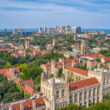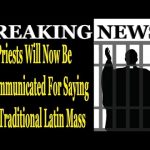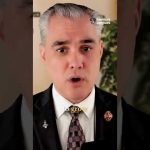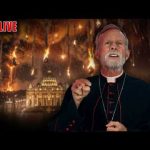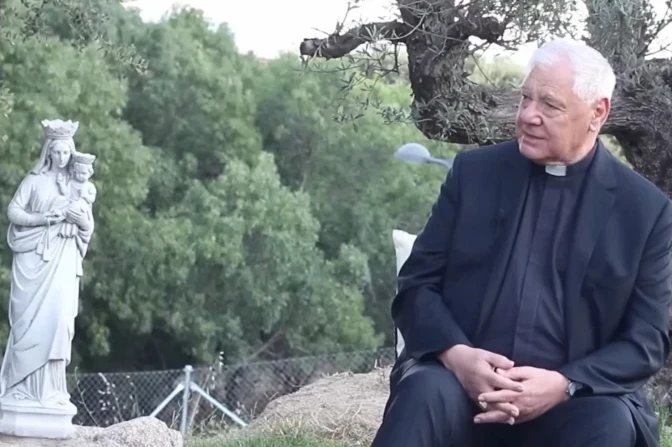
Cardinal Gerhard Müller. / Credit: La Sacristía de la Vendée
Madrid, Spain, Nov 11, 2025 / 08:00 am (CNA).
Cardinal Gerhard Müller, prefect emeritus of the Congregation for the Doctrine of the Faith, called for overcoming ideological divisions within the Catholic Church in a Spanish-language interview on the “Sacristy of the Vendé” YouTube channel in which he reflects on the “instrumentalization” of abuse cases.
Held last July, the interview was released this week after the coordinator of the priests’ YouTube discussion group, Father Francisco José Delgado, was acquitted of charges of “inciting hatred” against the Holy See, interfering in the Vatican’s investigation into the Sodality of Christian Life, and damaging the “good reputation” of layman José Enrique Escardó, one of the main proponents of the case against that apostolate.
Müller stated that, since its inception, the Catholic Church has experienced divisions “because of these false doctrines, heresies, or pagan ideologies” and thus proposed that “everyone has to be aware that one is following Jesus Christ and not ideologies.”
For the cardinal, within the Catholic Church it is not possible to define oneself as conservative, traditionalist, or progressive: “We must overcome these divisions that stem from the French Revolution, from the Jacobins. In the Parliament of that time, these right-wing and left-wing groups existed, but these are political and ideological concepts, not Christian ones.”
“We form one unity in Jesus Christ, one Christ, the head of the Church, and we are members of one body, one Lord, one God, one baptism, and one Eucharist. The sacraments are valid for everyone, and we are united in love, faith, and hope. This is the definition of the Church, not of an ideology or an NGO [nongovernmental organization].”
The exploitation of abuse cases
The prelate also addressed the issue of canonical processes stemming from accusations of sexual abuse and their exploitation both within and outside the Church. After acknowledging that victims “have every right to demand justice,” he stated that “justice cannot be demanded or achieved at the expense of the innocent.” To convict a person, he argued, “we need the certainty that he is guilty and also had a proper trial.”
“Alongside these real cases, we also have quite a few false accusations,” especially against deceased priests, noting that “some enemies of the Church exploit scandals, or non-scandals, when it comes to innocent people falsely accused, in order to damage the image of the Catholic priest.”
Faced with sweeping investigations into the entire Catholic Church, the cardinal advocated for examining individual cases “not indiscriminately against a group,” since, in his view, “this is also totalitarian thinking.”
In this regard, he added that the crime of abuse “has its cause in the morality or immorality of a person, not in the divine grace” of the sacrament of holy orders, in the case of priests. Otherwise, he pointed out, it would have to be said that “Jesus Christ is responsible for Judas’ betrayal.”
Delgado’s conversation with Müller also turned to the reality of martyrdom in 20th-century Spain and the Valley of the Fallen as a monument of reconciliation that the current Spanish government wants to redefine.
The Valley of the Fallen is a massive complex about 30 miles from Madrid inaugurated in 1959 and dedicated to the memory of those killed on both sides of the 1936–1939 Spanish Civil War. Among those buried there are a number of blesseds and servants of God martyred for the faith. During the war, the leftist side martyred thousands of clerics, religious, and laity. Some have been canonized and quite a few have been beatified.
The Valley of the Fallen was intended to be a place of national reconciliation and includes a basilica and monastery. However, as it was built by order of dictator Gen. Francisco Franco, whose right-wing Nationalist side won the conflict, the current leftist government led by the Spanish Socialist Workers Party considers it to be in some way a monument to the Franco regime and wants to “resignify” it for other purposes.
For the cardinal, “reconciliation in society, in the Church, in any community is not possible if the events of the past are forgotten,” emphasizing that the martyrs “are the crown, the jewels of the Church.”
“They are martyrs of the Gospel, witnesses to the Resurrection, to the victory of the risen Jesus, and therefore they are the first ones to invite all of us to overcome the ideologies that divide communities and the Church,” he said.
“The state must not decide on the value of the lives of others or the thoughts or beliefs of others. The state must remove itself from the conscience of people. The state is not God in the world,” he added.
This story was first published by ACI Prensa, CNA’s Spanish-language news partner. It has been translated and adapted by CNA.


